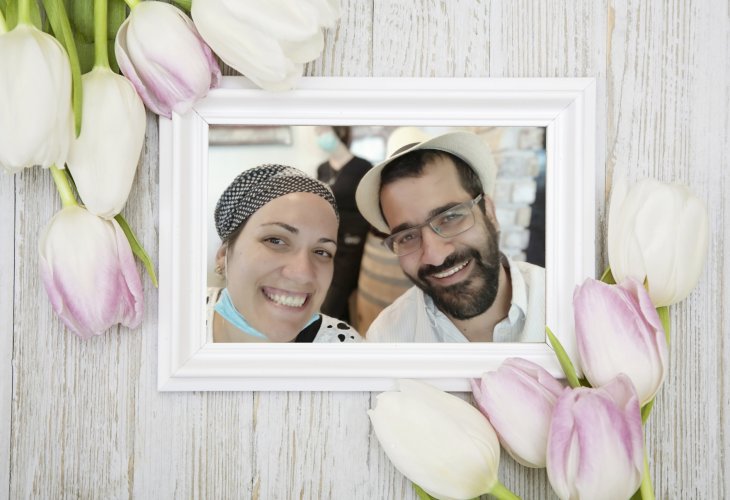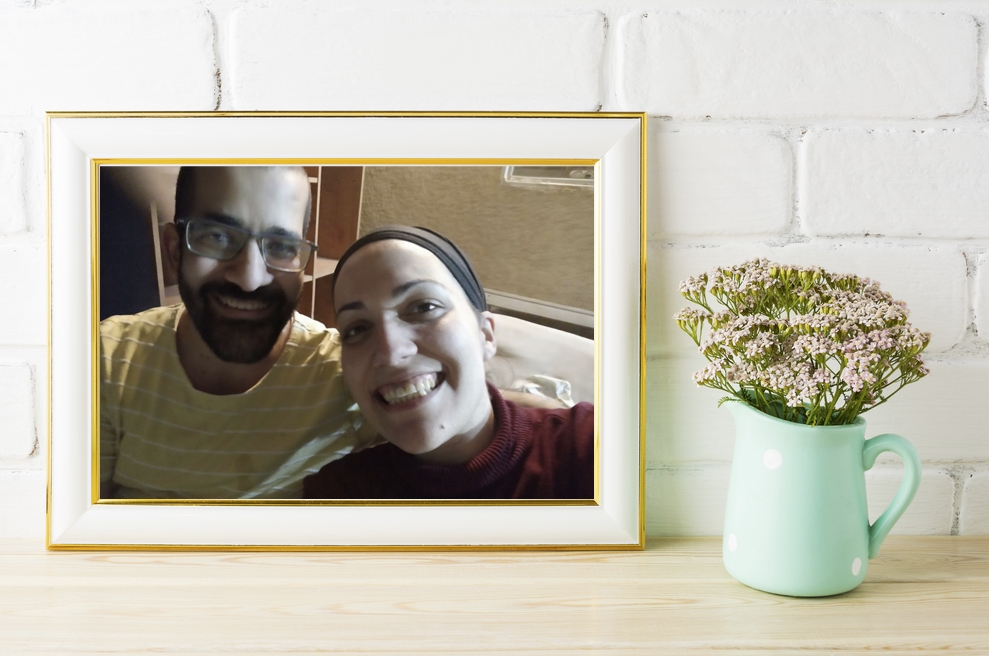"I Couldn't Believe I Became a Mother After Nearly 13 Years"
Yochai and Neta Brantz waited nearly 13 years for children. They underwent a journey of treatments and faced many disappointments and difficult news. Now, embracing their own baby, they aim to inspire others, and have a message for those surrounding them.
 Amichai and Neta Brantz
Amichai and Neta BrantzFinding a spare moment to chat with Neta Brantz is challenging. She is busy taking care of her 7-month-old son. The little one demands quite a bit, but Neta is happy and loving in every moment she dedicates to him. Even when we finally find a free moment to talk, she emphasizes, "I hope Peleg-Chaim won't interrupt us, he's not used to being ignored."
Peleg-Chaim, the sweet baby born to Neta and Yochai Brantz after nearly 13 years of waiting, gently babbles in the background, sounding content. "He is our personal miracle," Neta whispers with excitement. "The truth is, for a long time I hesitated to share our remarkable story. I usually don't favor success stories of women who had children after years. Not because I'm not happy for others, but because I believe each situation is unique, and comparisons lead nowhere. I decided to share to give strength to other couples struggling. I remember hearing such stories in the past and not believing a day would come when I could share my miracle. And now that day has come, and I too am fortunate."
"Crying and Moving On"
Neta's story began almost 13 years ago. "We got married at 20, a young and happy couple, unaware of the challenges ahead. The truth is, I became pregnant quite quickly, but it wasn't viable, and I had to go through a painful termination. The following year, I conceived again, but it ended in a miscarriage. I then required surgery, and throughout that period, we couldn't even try. Even afterward, the awaited news never came."
How does a young couple, longing for a child but not succeeding, feel?
"There are no words to describe it," Neta grieves, "these feelings are something you never get used to. Especially as those days, we began treatments, and time and again, after so much hope and expectations, the call from the department came: 'Sorry dear, it's negative again,' and that dreaded call came repeatedly.
"Initially, we tried to view the process as natural. We knew many couples faced similar challenges and didn't feel different, but as more years passed, it became increasingly frustrating and painful. We hoped and expected so much, yet nothing happened. After two more painful consecutive miscarriages, just before Peleg-Chaim's pregnancy, we nearly gave up. After reaching a heartbeat check, thinking everything was okay, we secluded ourselves at home for a few days, unsure of our next step. We had even considered adoption, submitted forms, and my husband suggested we stop treatments because it endangered me without results."
What helped you during those days? What gave you strength to continue?
"Faith is what helped us, and it's not a cliché. Just simple faith in Hashem that He wouldn't forget us and we'd eventually have our child. We believed without thinking about how or when it would happen. As they say - pure faith."
During that time, Neta notes they were advised to meet Rabbi Chaim Eidel in Tel Aviv. "My husband was so frustrated by everything we'd been through, he didn't want to meet anyone, but I managed to convince him and pleaded to try. It quickly became clear I was right. From the moment we met Rabbi Eidel, he filled us with hope. He encouraged us, understood our broken and desperate state, and from there, he lifted us. He also gave us a wine bottle, wishing we'd bless the bris of our son with it, and that's exactly what happened."
"Don't Say Anything, Just Be Silent"
Neta pauses and requests to discuss the painful topic of societal reactions. She has much to say about this. "I believe no one intends to hurt or cause pain, but ultimately, that's exactly what happens. I could write an encyclopedia on the bizarre and insensitive comments we received over the years. Some were truly appalling and devoid of basic sensitivity. For instance, someone approached my husband and said he was allowed to dismiss me according to the Talmud, since we'd been married for over ten years without children. There were also the standard chats from friends or family who complained about the difficulty with their own children and babies, forgetting that sitting beside them was someone longing for their own baby. There were also grandmothers and elderly aunts pushing more charms or scolding us, ‘Don't you want a child? What are you waiting for?' as if it were up to us. Even those who said nothing, their looks pierced us time and again."
And what can you say to people around a struggling couple? What's the right way to handle it?
"The main tip is to say nothing. Don’t inquire and don’t suggest doctors or remedies. One can assume the couple has tried everything. It’s hard to believe you’ll surprise them, but hurting them and causing distress is easy. This is, of course, unless the couple approaches to share voluntarily.
"I can testify that although my major sorrow has healed, some scars will never fully heal. As a rule, for every sentence you consider saying to the couple, think twice. Better to say nothing than to say and err."
There’s the common dilemma – we want to announce we’re expecting but are unsure if we should share this with a sister-in-law or sister who is still waiting. What do you think?
"I know the matter far too well. In recent years, I joined several waiting women's groups and noticed almost everyone discusses this. I don't think there's a clear answer because on one side, it's insulting to conceal, but on the other, it might hurt when someone approaches apologetically, saying, 'I wanted to tell you so you wouldn't get hurt...' I think behaving as normally as possible is better. Don’t hide, but also don’t make a special announcement and don’t ignore."
She also has something to say about the invitation to serve as kvater at a bris (the person who transfers the baby from the mother to the mohel). "Initially, it was okay, we were even happy. We felt it was a charm and could help, but eventually, the pain became so great that we started declining it too."
Pregnancy with Anxiety
At 32, after a short break from treatments for various reasons, Neta and her husband decided to continue. "Only this time, I told my husband I wanted to insist on something different, as I wasn’t ready for another miscarriage. I didn’t know what I was searching for, but after browsing online I found a Facebook group about miscarriages and first heard about a drug called 'Aspirin.' Women told me that after experiencing recurrent miscarriages, an aspirin preventative dose helped them successfully complete their pregnancies. Some also recommended using Clexane – a drug for women with blood clotting issues, even though I was sure I didn't have this problem.
I voluntarily approached a private hematologist," Neta continues, "and asked him for these medications. He claimed there seemed to be no reason for me to take them, but nonetheless agreed to let me try. Twelve days after this treatment, I got a positive result, and a few weeks later, we observed an embryo with a heartbeat."
Narrating her feelings during that time is challenging. "Both my husband and I tried to stay calm, not to get too attached to the pregnancy, not to build expectations. We feared crumbling as before. Doctors advised us to have three consecutive ultrasound checks. Each time, a heartbeat was recorded, and later we were told nearly certainly it was a boy. We would drive repeatedly to the women's health center, praying all the way, crying from excitement, and even when told everything was fine – still not getting attached to the baby. We constantly feared something would go wrong.
Meanwhile," adds Neta, "I developed gestational diabetes and drastically changed my diet. I monitored my sugar levels countless times a day, took insulin, attended high-risk pregnancy follow-ups, repeatedly heard everything was fine, yet still found myself in a pressure cooker."

Did you share the exciting news with close ones at that time?
"I can count the people who knew I was pregnant on my fingers. Until the last moment, we shared with almost no one. This was not difficult because, due to Corona, we barely left the house."
Eventually, Peleg Chaim was born at week 37, a sweet, plump, and particularly calm baby. "A baby of prayers," Neta exclaims with excitement. "Now he's seven months old, and to this moment, I can't believe that after twelve and a half years of marriage, we became parents."
Before concluding, Neta requests to repeatedly mention Rabbi Eidel's special support. "My husband invited him to be the sandek at the bris, but the rabbi said after all we went through, he thought it best if the child's father would be the sandek. So indeed, my husband was Peleg Chaim's sandek, and the feelings at the bris were extremely moving. I think we barely understood what was happening, we didn’t comprehend."
She is also convinced of another aspect that helped them achieve their personal miracle: "For a long period, we volunteered at the Soroka hospital," she recounts, "This involved hosting patients' families during some Shabbats, offering them formal Shabbat meals. We'd go around the wards, inviting people to dine with us, helping serve food, and setting tables. Often, we'd find individuals stuck at the hospital without even basic Shabbat meals. Our hosting was a real lifeline for them. The work was challenging, but the satisfaction so immense it drove us to volunteer time and again numerous times.
"In truth, there was also an added value, for we felt strengthened by these Shabbats. We met people dealing with tough situations, such as with family members teetering between life and death after accidents. This helped us gain perspective, realizing our struggle, though heavy, allowed us to remain healthy and whole, with countless other things to be thankful for."
They also heard that there’s a special blessing for fruitfulness associated with this volunteering. "The project managers generally only let childless couples volunteer," Neta clarifies, "as technically, such volunteering isn't feasible with children. Around us, we heard many moving stories about couples who gained salvation after volunteering in the ward, and I know they are currently looking for more couples, as all those who volunteered now have children and cannot continue.
"I can't know which among all our many acts of faith and efforts achieved our salvation," Neta concludes, "but I feel volunteering at Soroka contributed greatly. We received so many blessings from patients and their families during that time, upon hearing we were expecting, and I am sure their prayers reached heaven.
"There is always hope," she concludes emotionally, "even when you are at the deepest abyss. One just needs to believe and keep praying and hoping."
Phone number for couples wishing to volunteer at Soroka: 052-6176135

